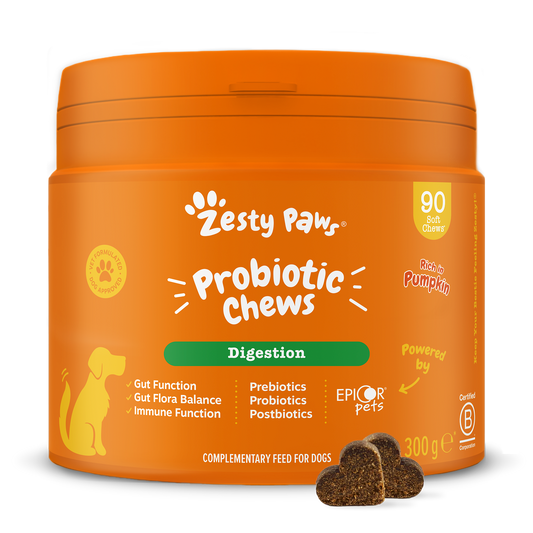Probiotics have been a popular health supplement for humans for several years now. But, are they good for dogs too? Pet parents are always looking for ways to keep their furry companions healthy and happy. As a result, probiotics have become a popular supplement to give to dogs. But, is it safe and effective to give probiotics to dogs?
Probiotics are live bacteria and yeasts that are good for your dog's health, especially the digestive system. These microorganisms help to maintain the balance of good bacteria in the gut and promote the growth of healthy bacteria. They have been found to counter urinary infections, boost the immune system, improve skin and coat, improve gut health and help with allergies. However, not all probiotics are the same, and not all of them are safe for dogs.
The Role of Probiotics in Dog Health
Gut Flora and Digestive Benefits
Probiotics are live bacteria and yeasts that are beneficial for the gut and overall health of dogs. These microorganisms help maintain a healthy balance of bacteria in the gut, which is crucial for proper digestion and absorption of nutrients. They also help prevent the growth of harmful bacteria that can lead to digestive problems such as diarrhoea, constipation, and flatulence.
Probiotics also produce short-chain fatty acids (SCFAs) that help maintain a healthy pH level in the gut, reducing the risk of inflammation and infection. Additionally, they help break down complex carbohydrates and fibre, which are essential for maintaining a healthy gut flora and digestion.
Immune System Enhancement
Approx. 70% of immune cells are housed in the gut. With 70–80% of immune cells being present in the gut, there is an intricate interplay between the intestinal microbiota, the intestinal epithelial layer, and the local mucosal immune system.
Probiotics can the immune system of dogs by stimulating the production of antibodies and white blood cells. This helps to fight off harmful pathogens and infections that can cause illness.
Probiotics can also help to reduce inflammation in the gut, which is linked to the development of chronic diseases such as inflammatory bowel disease (IBD) and allergies.
Overall Wellbeing and Probiotics
Probiotics have been shown to have a positive impact on the overall wellbeing of dogs. They can help improve skin and coat health, reduce bad breath, and promote a healthy weight. Additionally, probiotics can help reduce stress and anxiety in dogs, which can have a positive impact on their behaviour and mental health.
In conclusion, probiotics play a vital role in maintaining the digestive and overall health of dogs. They can help prevent and treat digestive problems, enhance the immune system, and improve the overall wellbeing of dogs. However, it is important to choose the right type and dosage of probiotics for your dog, and always consult with a vet before giving any supplements to your pet.
Types of Probiotics for Dogs
There are different types of probiotics that are available for dogs. These include single-strain probiotics, multi-strain probiotics, and synbiotics.
Single-Strain Probiotics
Single-strain probiotics contain only one type of bacteria strain. They are usually recommended for dogs with specific digestive issues or for dogs that require a specific type of bacteria strain. Single-strain probiotics are often used to treat diarrhoea, constipation, and other digestive problems.
Multi-Strain Probiotics
Multi-strain probiotics contain a combination of different strains of bacteria. They are often recommended for dogs with general digestive issues or for dogs that require a variety of bacteria strains. Multi-strain probiotics are often used to improve overall gut health and boost the immune system.
Synbiotics
Synbiotics are a combination of probiotics and prebiotics. Prebiotics are non-digestible food ingredients that stimulate the growth of beneficial bacteria in the gut. Synbiotics are often recommended for dogs with digestive issues or for dogs that require a combination of probiotics and prebiotics.
It is important to consult with a vet before giving any probiotics to your dog. They can help you choose the right type of probiotic and the appropriate dosage for your dog's specific needs.
Safety and Efficacy
Potential Side Effects
Although probiotics are generally considered safe, there are some potential side effects that dog owners should be aware of. These may include mild gastrointestinal upset, such as bloating, gas, and diarrhoea. In rare cases, dogs may experience an allergic reaction to the probiotic supplement, which may cause symptoms such as itching, hives, and difficulty breathing. If you notice any adverse effects after giving your dog probiotics, it is important to stop the supplement immediately and consult with a vet.
Proper Dosage Guidelines
Proper dosage guidelines for probiotics can vary depending on the brand and formulation. It is important to follow the manufacturer's instructions carefully and consult with a vet before giving your dog any probiotics. In general, probiotics should be given with food to help protect the live bacteria from stomach acid. It is also important to store probiotics in a cool, dry place to help maintain their potency.
In summary, while probiotics may have potential benefits for dogs' digestive health, it is important to approach them with caution and consult with a vet before giving them to your dog. It is also important to be aware of potential side effects and proper dosage guidelines.
Probiotic Supplements for Dogs
Probiotic supplements are a popular way to add beneficial bacteria to a dog's diet. These supplements come in a chew format. It's important to choose a supplement that is specifically formulated for dogs, as human probiotics may not be suitable for canine consumption. Try our Zesty Paws Pumpkin Probiotic Chews to support your dog's digestion—explore our products here.


